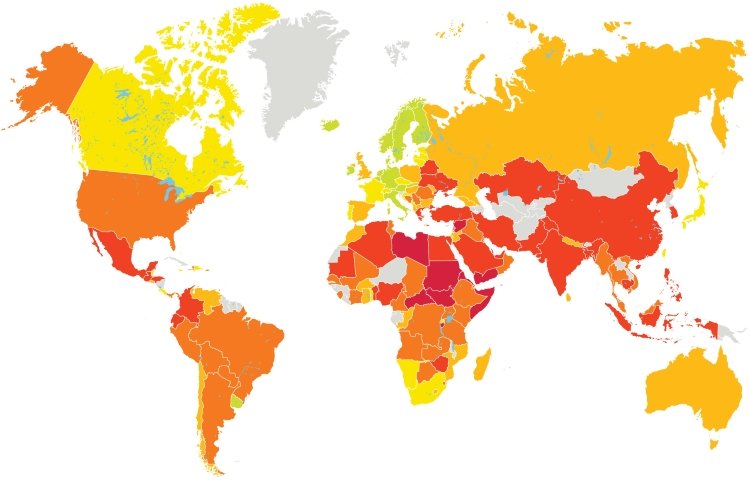This exchange followed further intensification of intergovernmental relations and exchanges. The government of Georgia has implemented a set of liberal reforms in recent years and while their results are at best questionable, they are widely presented as success of Georgian reformism and publicized by mass media – in western countries, but in Kyrgyzstan also. Therefore the objective of the trade union meeting was to inform trade union and broader community about real state of affairs in Georgia and about the world of labour in the country in particular.
President of the FPKg Asylbek Toktogulov presented the situation in trade union movement and in the country. With the stabilization of the government after “revolutionary” period, the course on liberal reforms was adopted, including reforms in the labour sphere. This approach was widely protested by Kyrgyz unions. First, the present labour code was revised only several years ago and hence reflects the labour market realities. Secondly, the developed draft is clearly disbalanced and favors employers’ interests at expense of workers’ rights. And thirdly, no proper consultations were organized and existing social dialog structures were ignored. Reports that Georgian “reformators” were advising proposed changes have been voiced, particularly as Georgian experts were invited by the Kyrgyz government as consultants. Furthermore, high level state officials of both countries were engaged in sets of visits and exchanges.
The FPKg organized a set of protests, supported internationally by the ITUC, which resulted in a shift towards more reasonable and moderate approach on the side of the government and a working group has been formed that includes trade union representatives. The work of this balanced group was positively assessed by all the stakeholders, including the FPKg. However, just two weeks ago the government, in violation of the established procedures, unilaterally submitted amendments to certain articles of the labour code to the parliament, which adopted them in a hasty manor. These amendments de facto will allow employers to list in the labour contract reasons for termination of employment that could differ from the reasons listed in the labour code. In reality, that would lead to a situation that employer would be able to introduce such reasons that an employee would lose any protection from “unjustifiable” dismissal. Kyrgyz unions addressed the President with request to veto the law.
Irakliy Petriashvili, GTUC President, confirmed that the same approach was used by the Georgian government several years ago. While reforms in such spheres as police should be commended, the other reforms, of labour, first of all, clearly served interests of a tiny group of elite business and state officials. Georgian labour code de jure gave employers right to fire any worker without explaining the reasons. Workers could be denied employment without any explanation. Different laws and institutions were abolished, including law on collective bargaining and labour inspection. In reality, workers were put in absolute dependency from employers and their “good will”, - in the country, where official unemployment figures reach 17%, while in reality 70% or population are unemployed and leave from occasional income or small harvests their tiny lands could deliver. The employer can legally discriminate workers on any basis – trade union membership, political attitudes or simply “for disagreeing with employers’ will” – by firing or not hiring, can press workers to work in hazardous and dangerous condition under threat of dismissal. The GTUC submitted different complaints to the ILO and the ILO supervisory bodies urged the government to change the laws to ensure protection from discrimination and promotion of collective government. For some time the government ignored recommendations.
As the Georgian trade union movement consolidated itself under new leadership and campaigned against the labour code and implications of its application on unions and workers, repressions against trade union activists and leaders started. Threats and dismissals, pressure to leave the GTUC unions, establishment of yellow unions, abolition of check-off systems and unilateral termination of collective agreements – all these measures are part of the government’s campaign to undermine union strength and power. The GTUC, however, supported by the ITUC and its affiliates, has been repulsing the attacks. Moreover, with the support of the ITUC and the AFL-CIO, trade relations of Georgia with the EU and US – the relations that prescribe respect of the ILO norms – are put in question. On that basis the Georgian government started being concerned as non-respect of the ILO norms could lead to significant loose in trade perspectives. However, despite some symbolic moves, the antiunion legislation stays in place and antiunion repressions continue. The cynicism of the authorities culminated when the state police was called to suppress the strike in Hercules plant, to jail the strikers and to force them to work. The FPKg unions should be aware and stay alerted, build its capacities to act and to inform broader population about the real face of so called Georgian success.
Anton Leppik informed about the ITUC and its activities, concentrating in particular on trade union rights and campaigns to enforce them. He told that in European region there were two countries where trade union rights were under brutal attack of the government and that in these states, as in Kyrgyzstan, the labour reforms led to similar situation: while in Belarus regime of Lukashenko imposed short-term contract system that is being used to suppress independent trade unionism, the Georgian labour code de facto serves the same purpose: to give employers right to fire any discontent worker. The introduction of amendment to the labour code in Kyrgyzstan would serve the same purpose. The Geogian liberal experiment has been spreading to other countries, Kyrgyzstan included, but also to EU countries, where under crisis pretext labour relations systems were reformed to the detriment of workers’ rights. The ITUC-PERC prioritises actions to resist these attacks and to regain workers’ rights and is ready to support the FPKg in its fight for workers interests. It uses international supervisory mechanisms of the ILO, advocacy with international organisations including International Monetary Fund and World Bank, the European Union, and the emerging structures for global economic governance – G8 and G20, and also engages its affiliates into campaigning, capacity building and raising awareness issues to do that. He also expressed hope that the cooperation with the FPKg would be strengthened and the affiliation processes would be relaunched with the stabilization and the consolidation of the FPKg trade union family.
Irakliy Petriashvili added that international solidarity support – on political but also on practical level – played vital role in reorganizing Georgian unions and making them able to withstands antiunion repressions. He offered the FPKg assistance of Georgian unions, its experience and expertise in fighting liberal moves, but also in improving FPKg structures and its international role, which was gladly supported by the FPKg leadership. Furthermore, Asylbek Toktogulov called for trade union unity and consolidation, for concentration of all union efforts on external threats and reiterated FPKg intention to join the ITUC family and to engage international solidarity in its fight for decent work in the country.



